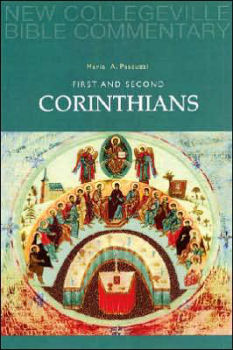
|
Posted February 1, 2006
Book: First and Second Corinthians Author: Maria A. Pascuzzi Liturgical Press, Collegeville, MN, 2006, pp. 152 An Excerpt from the Jacket:
The Corinth community, she writes, was characterized by rivalry, obsession with status and superior wisdom, disregard for the less spiritually gifted and the poor, sexual immorality, assertiveness regarding individual rights, and a disdainful attitude toward Paul. Thatís the Bad News. But the Good News is that we learn what contributes to inauthentic Christian living today and what promotes ours own continued transformation in light of the Gospel. Pascuzziís commentary is substantial, clear, and challenging. An Excerpt from the Book: Corinthians 4:7-5: 10 A ministry of affliction In this second phase of his defense, Paul reflects on the paradoxical nature of authentic Christian ministry. Logically, the treasure, that is, this great ministry of glory, ought to be entrusted to a robust and resilient minister equal to the task. But it has been entrusted to Paul, weak and fragile as a common clay jar with a short shelf life. This paradoxical arrangement is not accidental but essential. Paulís weakness attests that apostolic ministry is powered by God and not the apostle, a fact borne out in the four antitheses set out in verses 8-9. In the course of his ministry, Paul survived potentially devastating adversities, not by the dint of his own inner resources but by the power of God. Paulís suffering and weakness also attest to his union with Christ, whose suffering and death, Paul firmly believes, are being replicated in his own life of suffering and always with the paradoxical result that life truimphs. Tis is evidenced among the Corinthians themselves. Life is at work in them, while, and precisely because, death is at work in Paul (vv. 10-12). However much Paulís suffering demonstrates Godís power, affirms his union with Christ, and is the source of life for others ó all good things ó what ultimately makes his suffering bearable is the knowledge taht he and all believers will be raised and brought into the presence of God and Christ. This certainty is rooted in the belief Paul shares with the Corinthians that God who raised Jesus will also raise them (vv. 13-14). V erse 15 expands the thought of verse 12. Everything Paul suffers is for the community, so that the life that more and more of them come to experience will occasion praise and thanks to God. Paulís firm hope in the resurrection and his present lived experience of inner renewal, even while his body is consumed by the rigors of ministry, bring him to affirm again, ďwe are not discouraged.Ē Table of Contents: 1:1-9 Introduction 1:1-3 Greeting 1:4-9 Thanksgiving 1:10-4:21 Argument for Unity in the Community 1:10-17 Divisions in the community 1:18-2:5 The wisdom of the Cross 2:6-3:4 The wisdom of the mature 3:5-23 The community and its leaders 4:1-21 Cross-wisdom: the ultimate critique 5:1-6:20 Arguments concerning immorality within the community and relationships with those outside the community 5:1-13 Argument against sexual immorality 6:1-11 Argument against recourse to pagan courts 6:12-20 Argument against sexual immorality 7:1-40 Concerning Marriage and Sexual Relations 7:1-16 Advice to the married, unmarried, and widows 7:17-24 Advice on oneís social status 7:25-40 Advice to virgins/engaged couples, married women, and widows 8:1-11: 1 Argument Concerning Food Offered to Idols 8:1-13 Concern for others trumps knowledge as a criterion for action 9:1-27 Renunciation of rights: an illustration based on Paulís praxis 10:1-13 Complacency and Godís wrath: an example based on Israelís past 10:14-22 Against communion with idols: judge for yourselves 10:23-11:1 Summary: seek the good of others 11:2-14:40 Arguments Concerning Aspects of Community Worship 11:2-16 Argument concerning hairstyless 11:17-34 Argument concerning division and abuses at the Lordís Supper 12:1-14: 40 Argument concernng spiritual gifts 15:1-58 Argument for the Resurrection 15:1-11 The resurrection of Christ: rehearsing the facts 15: 12-34 The reality of the resurrection of the dead 15:35-49 The resurrection body 15:50-58 The resurrection event 16:1-24 Conclusion 16:1-12 The collection, Paulís travel plans, Apollos 16:13-24 Concluding exhortations and greetings |
|
